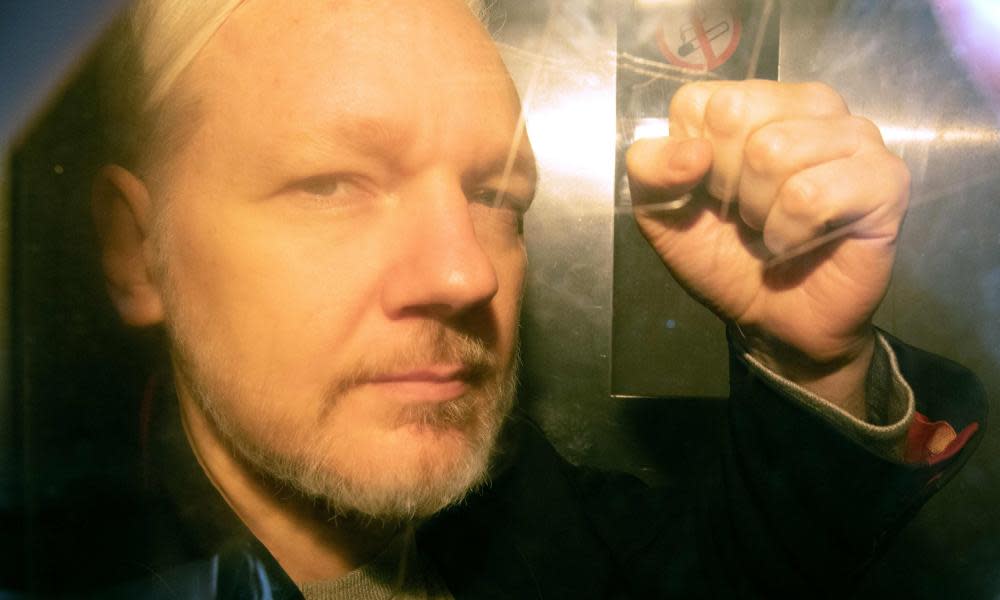Julian Assange due in court in latest stage of fight against US extradition

The WikiLeaks founder, Julian Assange, is due to appear at the Old Bailey in the latest stage of his legal battle against extradition to the US, where he faces a prison sentence of up to 175 years.
The hearing, which is scheduled to last four weeks, will hear allegations from the US Department of Justice that Assange tried to recruit hackers to find classified government information.
A US grand jury previously indicted Assange on 18 charges, 17 of which fall under the US Espionage Act. They cover conspiracy to receive, obtaining and disclosing classified diplomatic and military documents.
Related: US attorney general may be using Assange case for political ends, court told
His lawyers say they have been given insufficient time to examine a new US indictment. They argue that the prosecution is politically motivated and that Assange is being pursued because WikiLeaks published US government documents that revealed evidence of war crimes and human rights abuses.
It will be the first time Assange, 49, has been in court for many months. He missed several recent appearances because of illness.
For the past 16 months, since being arrested in the Ecuadorian embassy in April 2019, he has been held on remand at Belmarsh prison. The extradition hearing was delayed because of the Covid-19 crisis. His supporters are expected to stage a protest outside the court as he arrives from the prison. Assange’s partner, Stella Moris, a South African-born lawyer, is expected to be among those in court.
Moris told PA Media Assange had lost a lot of weight in prison, his health was deteriorating and she feared her children would grow up without seeing their father.
She said: “Julian’s case has huge repercussions for freedom of expression and freedom of the press. This is an attack on journalism. If he is extradited to the US for publishing inconvenient truths about the wars in Iraq and Afghanistan, then it will set a precedent, and any British journalist or publisher could also be extradited in the future.”
Because of physical distancing requirements, only a few seats have been made available to the media and other observers, including NGOs and MEPs, in a separate courtroom in the Old Bailey. They will watch proceedings on a screen.
The case is being heard by the district judge Vanessa Baraitser, who normally sits at Westminster magistrates court and regularly hears extradition cases.
Among the lawyers representing Assange are Edward Fitzgerald QC and Jennifer Robinson of Doughty Street Chambers as well as Gareth Peirce of the law firm Birnberg Peirce.
Fitzgerald raised concerns at a preliminary hearing about problems communicating with his client. At one hearing, he said: “We’ve had great difficulties in getting into Belmarsh to take instructions from Mr Assange and to discuss the evidence with him … We simply cannot get in as we require to see Mr Assange and to take his instruction.”
Numerous human rights organisations and freedom of speech groups have condemned the US extradition request. Amnesty International has said Assange is at risk of “serious human rights violations including possible detention conditions that would amount to torture and other ill-treatment” in the US. The espionage charges, it adds, “could have a chilling effect on the right to freedom of expression, leading journalists to self-censor from fear of prosecution”.
The UN’s special rapporteur on torture, Prof Nils Melzer, who has visited him in Belmarsh, has said Assange is showing all the symptoms associated with prolonged exposure to psychological torture and should not be extradited to the US.
Claims that Assange was illegally monitored while he stayed in the Ecuadorian embassy in London and that sensitive information was passed to the CIA are likely to feature at the hearing. A Spanish court has heard allegations that while Assange was in the embassy, his conversations were recorded and his computer data downloaded; the information was then allegedly sold to US intelligence agencies.
Any decision made by the district judge is likely to go to appeal at a higher court.

 Yahoo News
Yahoo News 
